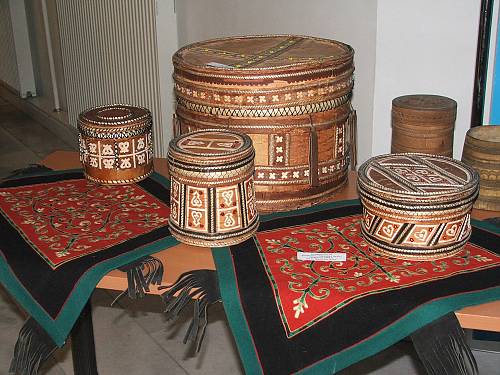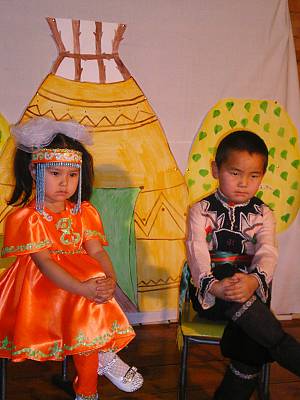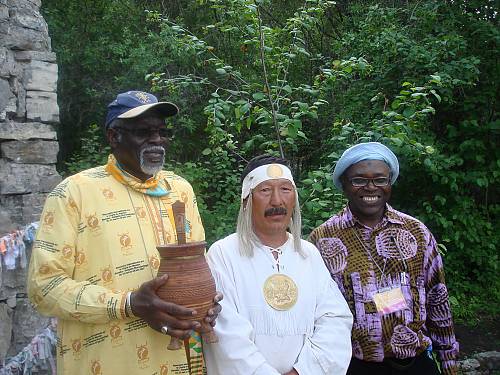Olonkho, Yakut heroic epos
Russian Federation ◈
Your browser is not supported by this application. Please use recent versions of browsers such as Google Chrome, Firefox, Edge or Safari to access 'Dive' interfaces.
Inscribed in 2008 (3.COM) on the Representative List of the Intangible Cultural Heritage of Humanity (originally proclaimed in 2005)
One of the oldest epic arts of the Turkic peoples, the termOlonkho refers to the entire Yakut epic tradition as well as its central epic.Today, it is still incidentally performed in the Sakha Republic, situated in the far east of the Russian Federation.
The poetic tales, which vary from 10 to 15,000 verses in length, are performed by the Olonkho singer and story-teller in two parts: a sung part in verse alternates with the prosaic part composed of recitatives. In addition to possessing good acting and singing skills, the narrator must be a master of eloquence and poetic improvisation. The epic consists of numerous legends about ancient warriors, deities, spirits and animals, but also addresses contemporary events, such as the disintegration of nomadic society.
Given that each community had its own narrator with a rich repertoire, numerous versions of Olonkho circulated. The tradition was developed within the family context for entertainment and as a means of education. Reflecting Yakut beliefs, it also bears witness to the way of life of a small nation struggling for survival at times of political unrest and under difficult climatic and geographical conditions.
The political and technological changes in twentieth-century Russia have threatened the existence of the epic tradition in the Sakha Republic. Although there has been a growing interest in Olonkho since the perestroika years, this tradition is endangered in view of the very low number of practitioner, all of old age.

- © 2009 by the National Committee on UNESCO affairs of the Sakha Republic (Yakutia)

- © 2009 by the National Committee on UNESCO affairs of the Sakha Republic (Yakutia)

- © 2009 by the National Committee on UNESCO affairs of the Sakha Republic (Yakutia)

- © 2009 by the National Committee on UNESCO affairs of the Sakha Republic (Yakutia)

- © 2009 by the National Committee on UNESCO affairs of the Sakha Republic (Yakutia)

- © 2009 by the National Committee on UNESCO affairs of the Sakha Republic (Yakutia)

- © 2009 by the National Committee on UNESCO affairs of the Sakha Republic (Yakutia)

- © 2009 by the National Committee on UNESCO affairs of the Sakha Republic (Yakutia)

- © 2009 by the National Committee on UNESCO affairs of the Sakha Republic (Yakutia)

- © 2009 by the National Committee on UNESCO affairs of the Sakha Republic (Yakutia)

- © 2009 by the National Committee on UNESCO affairs of the Sakha Republic (Yakutia)

- © 2009 by the National Committee on UNESCO affairs of the Sakha Republic (Yakutia)

- © 2009 by the National Committee on UNESCO affairs of the Sakha Republic (Yakutia)

- © 2009 by the National Committee on UNESCO affairs of the Sakha Republic (Yakutia)

- © 2009 by the National Committee on UNESCO affairs of the Sakha Republic (Yakutia)

- © 2009 by the National Committee on UNESCO affairs of the Sakha Republic (Yakutia)

- © 2009 by the National Committee on UNESCO affairs of the Sakha Republic (Yakutia)

- © 2009 by the National Committee on UNESCO affairs of the Sakha Republic (Yakutia)

- © 2009 by the National Committee on UNESCO affairs of the Sakha Republic (Yakutia)

- © 2009 by the National Committee on UNESCO affairs of the Sakha Republic (Yakutia)

- © 2009 by the National Committee on UNESCO affairs of the Sakha Republic (Yakutia)

- © 2009 by the National Committee on UNESCO affairs of the Sakha Republic (Yakutia)

- © 2009 by the National Committee on UNESCO affairs of the Sakha Republic (Yakutia)

- © 2009 by the National Committee on UNESCO affairs of the Sakha Republic (Yakutia)

- © 2009 by the National Committee on UNESCO affairs of the Sakha Republic (Yakutia)

- © 2009 by the National Committee on UNESCO affairs of the Sakha Republic (Yakutia)

- © 2009 by the National Committee on UNESCO affairs of the Sakha Republic (Yakutia)

- © 2009 by the National Committee on UNESCO affairs of the Sakha Republic (Yakutia)

- © 2009 by the National Committee on UNESCO affairs of the Sakha Republic (Yakutia)

- © 2009 by the National Committee on UNESCO affairs of the Sakha Republic (Yakutia)

- © 2009 by the National Committee on UNESCO affairs of the Sakha Republic (Yakutia)

- © 2009 by the National Committee on UNESCO affairs of the Sakha Republic (Yakutia)

- © 2009 by the National Committee on UNESCO affairs of the Sakha Republic (Yakutia)

- © 2009 by the National Committee on UNESCO affairs of the Sakha Republic (Yakutia)

- © 2009 by the National Committee on UNESCO affairs of the Sakha Republic (Yakutia)

- © 2009 by the National Committee on UNESCO affairs of the Sakha Republic (Yakutia)

- © 2009 by the National Committee on UNESCO affairs of the Sakha Republic (Yakutia)

- © 2009 by the National Committee on UNESCO affairs of the Sakha Republic (Yakutia)

- © 2009 by the National Committee on UNESCO affairs of the Sakha Republic (Yakutia)

- © 2009 by the National Committee on UNESCO affairs of the Sakha Republic (Yakutia)

- © 2009 by the National Committee on UNESCO affairs of the Sakha Republic (Yakutia)

- © 2009 by the National Committee on UNESCO affairs of the Sakha Republic (Yakutia)

- © 2009 by the National Committee on UNESCO affairs of the Sakha Republic (Yakutia)

- © 2009 by the National Committee on UNESCO affairs of the Sakha Republic (Yakutia)

- © 2009 by the National Committee on UNESCO affairs of the Sakha Republic (Yakutia)

- © 2009 by the National Committee on UNESCO affairs of the Sakha Republic (Yakutia)

- © 2009 by the National Committee on UNESCO affairs of the Sakha Republic (Yakutia)

- © 2009 by the National Committee on UNESCO affairs of the Sakha Republic (Yakutia)

- © 2009 by the National Committee on UNESCO affairs of the Sakha Republic (Yakutia)

- © 2009 by the National Committee on UNESCO affairs of the Sakha Republic (Yakutia)

- © 2009 by the National Committee on UNESCO affairs of the Sakha Republic (Yakutia)

- © 2009 by the National Committee on UNESCO affairs of the Sakha Republic (Yakutia)

- © 2009 by the National Committee on UNESCO affairs of the Sakha Republic (Yakutia)

- © 2009 by the National Committee on UNESCO affairs of the Sakha Republic (Yakutia)

- © 2009 by the National Committee on UNESCO affairs of the Sakha Republic (Yakutia)

- © 2009 by the National Committee on UNESCO affairs of the Sakha Republic (Yakutia)

- © 2009 by the National Committee on UNESCO affairs of the Sakha Republic (Yakutia)

- © 2009 by the National Committee on UNESCO affairs of the Sakha Republic (Yakutia)

- © 2009 by the National Committee on UNESCO affairs of the Sakha Republic (Yakutia)



























































